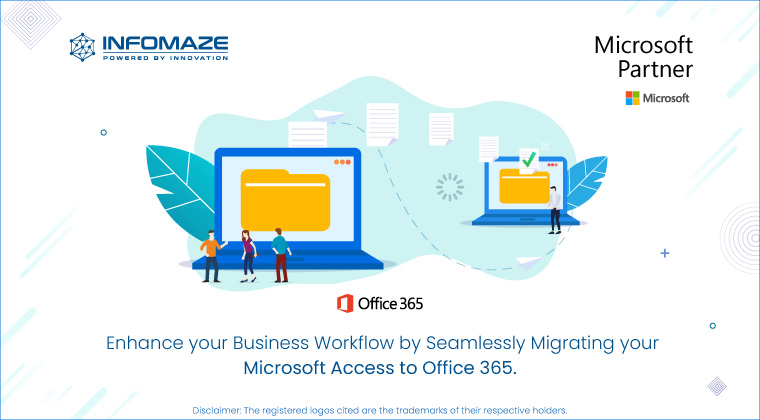- Buy Office 365
- Microsoft Access For Mac Office 365
- Microsoft Access And Office 365
- Is Access Included In 365
The Microsoft 365 Access Runtime enables you to distribute Access 365 applications to users who do not have the full version of Microsoft 365 Access installed on their computers (as is the case with Office 365 Enterprise E1 and Microsoft 365 Business Basic). You can also use it with Office 2019. Many of the existing Microsoft cloud applications are included in the list of applications you can select from. Administrators can assign a Conditional Access policy to the following cloud apps from Microsoft. Some apps like Office 365 and Microsoft Azure Management include multiple related child apps or services. Microsoft Office Access 2007 Forms, Reports, and Queries. Illustrated Microsoft Office 365 & Office 2016 Projects, Loose-leaf Version Carol M. Migrate Microsoft Access database to Office 365 to meet the requirements of your modern enterprise. The good thing about Office 365 is that it exists on the cloud and is extremely adaptable. You can relocate any amount of data from emails to apps to Office 365 and immediately figure out what might go wrong if you migrate the entire organization.
-->Cloud apps or actions are a key signal in a Conditional Access policy. Conditional Access policies allow administrators to assign controls to specific applications or actions.
- Administrators can choose from the list of applications that include built-in Microsoft applications and any Azure AD integrated applications including gallery, non-gallery, and applications published through Application Proxy.
- Administrators may choose to define policy not based on a cloud application but on a user action. We support two user actions
- Register security information (preview) to enforce controls around the combined security information registration experience
- Register or join devices (preview) to enforce controls when users register or join devices to Azure AD.
Microsoft cloud applications
Many of the existing Microsoft cloud applications are included in the list of applications you can select from.
Administrators can assign a Conditional Access policy to the following cloud apps from Microsoft. Some apps like Office 365 and Microsoft Azure Management include multiple related child apps or services. We continually add more apps, so the following list is not exhaustive and is subject to change.
- Azure Analysis Services
- Azure DevOps
- Dynamics CRM Online
- Microsoft Application Insights Analytics
- Microsoft Azure Subscription Management
- Microsoft Cloud App Security
- Microsoft Commerce Tools Access Control Portal
- Microsoft Commerce Tools Authentication Service
- Microsoft Flow
- Microsoft Forms
- Microsoft Intune
- Microsoft Planner
- Microsoft PowerApps
- Microsoft Search in Bing
- Microsoft StaffHub
- Microsoft Stream
- Microsoft Teams
- Exchange Online
- SharePoint
- Yammer
- Office Delve
- Office Sway
- Outlook Groups
- Power BI Service
- Project Online
- Skype for Business Online
- Virtual Private Network (VPN)
- Windows Defender ATP
Applications that are available to Conditional Access have gone through an onboarding and validation process. This does not include all Microsoft apps, as many are backend services and not meant to have policy directly applied to them. If you are looking for an application that is missing, you can contact the specific application team or make a request on UserVoice.

Office 365
Microsoft 365 provides cloud-based productivity and collaboration services like Exchange, SharePoint, and Microsoft Teams. Microsoft 365 cloud services are deeply integrated to ensure smooth and collaborative experiences. This integration can cause confusion when creating policies as some apps such as Microsoft Teams have dependencies on others such as SharePoint or Exchange.
The Office 365 app makes it possible to target these services all at once. We recommend using the new Office 365 app, instead of targeting individual cloud apps to avoid issues with service dependencies. Targeting this group of applications helps to avoid issues that may arise due to inconsistent policies and dependencies.
Administrators can choose to exclude specific apps from policy if they wish by including the Office 365 app and excluding the specific apps of their choice in policy.
Key applications that are included in the Office 365 client app:
- Microsoft Flow
- Microsoft Forms
- Microsoft Stream
- Microsoft To-Do
- Microsoft Teams
- Exchange Online
- SharePoint Online
- Microsoft 365 Search Service
- Yammer
- Office Delve
- Office Online
- Office.com
- OneDrive
- PowerApps
- Skype for Business Online
- Sway
Microsoft Azure Management
The Microsoft Azure Management application includes multiple underlying services.
- Azure portal
- Azure Resource Manager provider
- Classic deployment model APIs
- Azure PowerShell
- Azure CLI
- Visual Studio subscriptions administrator portal
- Azure DevOps
- Azure Data Factory portal
Note
Buy Office 365
The Microsoft Azure Management application applies to Azure PowerShell, which calls the Azure Resource Manager API. It does not apply to Azure AD PowerShell, which calls Microsoft Graph.
Other applications
In addition to the Microsoft apps, administrators can add any Azure AD registered application to Conditional Access policies. These applications may include:
- Applications published through Azure AD Application Proxy
- Applications that use password based single sign-on
Microsoft Access For Mac Office 365

Note
Since Conditional Access policy sets the requirements for accessing a service you are not able to apply it to a client (public/native) application. Other words the policy is not set directly on a client (public/native) application, but is applied when a client calls a service. For example, a policy set on SharePoint service applies to the clients calling SharePoint. A policy set on Exchange applies to the attempt to access the email using Outlook client. That is why client (public/native) applications are not available for selection in the Cloud Apps picker and Conditional Access option is not available in the application settings for the client (public/native) application registered in your tenant.
User actions
User actions are tasks that can be performed by a user. Currently, Conditional Access supports two user actions:
Microsoft Access And Office 365
Register security information: This user action allows Conditional Access policy to enforce when users who are enabled for combined registration attempt to register their security information. More information can be found in the article, Combined security information registration.
Register or join devices (preview): This user action enables administrators to enforce Conditional Access policy when users register or join devices to Azure AD. It provides granularity in configuring multi-factor authentication for registering or joining devices instead of a tenant-wide policy that currently exists. There are three key considerations with this user action:
Require multi-factor authenticationis the only access control available with this user action and all others are disabled. This restriction prevents conflicts with access controls that are either dependent on Azure AD device registration or not applicable to Azure AD device registration.Client appsandDevice stateconditions are not available with this user action since they are dependent on Azure AD device registration to enforce Conditional Access policies.- When a Conditional Access policy is enabled with this user action, you must set Azure Active Directory > Devices > Device Settings -
Devices to be Azure AD joined or Azure AD registered require Multi-Factor Authenticationto No. Otherwise, the Conditional Access policy with this user action is not properly enforced. More information regarding this device setting can found in Configure device settings.
.png/300px-Microsoft_Access_2013_on_Windows_8_(screenshot).png)
Is Access Included In 365
Next steps
